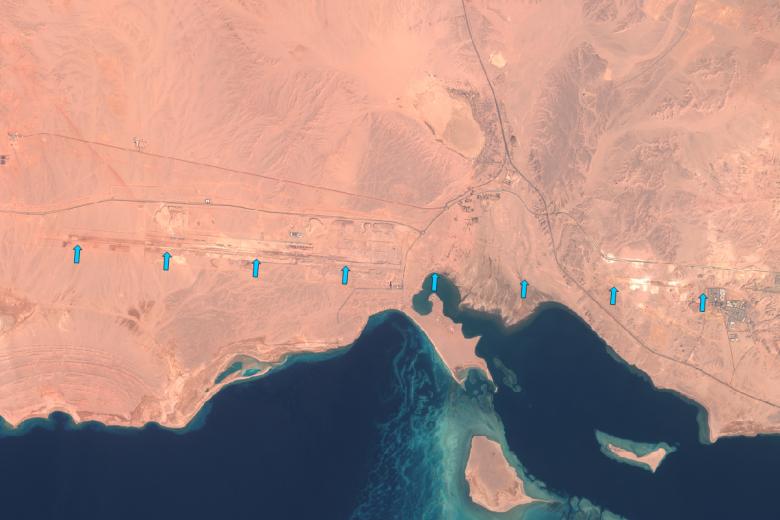Tracking The Line
John Hill
6. 2月 2023
A portion of satellite imagery from October 2022 indicating excavation progress for The Line (Photo via Wikimedia Commons)
Satellite imagery, an exhibition, and a promotional video illustrate that progress is being made on The Line, the flagship city for NEOM, the $500 billion megaproject in Saudi Arabia.
It's been about six months since we last checked in on The Line, the audacious linear megacity we first learned about at the beginning of January 2021, when the project was launched by Saudi Crown Prince Mohammed bin Salman. Last summer saw additional details on the 170-kilometer long, 500-meter tall, 200-meter wide city for 9 million people revealed in the form of a short promotional video.
Another promo vid, released two weeks ago, shows progress on The Line as well as the numerous other industrial pieces and urban complexes that make up NEOM, such as Sindalah luxury island, Oxagon industrial complex, and Trojena, which will host the Asian Winter Games in 2029:
Open from November 6, 2022 until April 29, 2023, THE LINE Experience in Riyadh displays the megacity's concept of “Zero Gravity Urbanism” in models, renderings, videos, and other imagery. NEOM boasts, in the video above, that it will be visited by “some 200,000 people.” The exhibition, part of the Diriyah Biennale Foundation for Contemporary Art in the city's Jax district, enabled Architects' Journal and other outlets to see who is credited with working on the project. Names include Morphosis, not a surprise given reports last year indicating their involvement, but also OMA, Fuksas, Adjaye Associates, Coop Himmelb(l)au, UNStudio, Peter Cook, DMAA, Oyler Wu, Pei Cobb Freed, and HOK. (A visitor's photo from within the exhibition shows these names.)
“Current excavation progress of The Line (as of October 17th and 19th 2022). Mosaic of four Sentinel-2 images from October 17th and 19th, with scale in kilometer.” (Photo via Wikimedia Commons — click for larger view)
While the video above includes brief glimpses of aerial footage showing excavation for The Line, those looks pale in comparison to the satellite imagery revealing large portions of the linear megacity under construction. The scale of the undertaking is phenomenal, and size alone seems to be an aspect that has garnered the project numerous vocal fans (just look at the comments of any NEOM video) but also many opponents, the latter for its massive use of nonrenewable resources as well as the questionable sustainability benefits proffered by the developers, among other issues. The progress to date, though limited and most likely not on track for an ambitious 2030 completion, nevertheless points to a strong drive to realize the project as visualized, regardless of the many criticisms that will continue to be levied at the project.
関連した記事
-
NEOM Updates
1 month ago
-
Morphosis Departs The Line
on 2024/07/01
-
Designs for The Line Exhibited in Venice
on 2023/05/25
-
Tracking The Line
on 2023/02/06
-
What, Again, Is 'The Line'?
on 2022/07/26

